Conference and Banqueting Management Report - Semester 1, 2019
VerifiedAdded on 2021/02/21
|9
|2752
|25
Report
AI Summary
This report delves into the intricacies of conference and banqueting management within the hospitality sector. It begins by exploring the size and scope of the industry, highlighting its significant contribution to the UK economy and its global presence. The report then identifies various factors that influence business development, including political, environmental, socio-cultural, and technological aspects. Key strategies and operational issues within the business are analyzed, encompassing employee welfare, customer service, risk management, and compliance with legal regulations. Finally, the report discusses performance and quality review techniques, such as budget reviews, food and beverage assessments, and transportation inspections, providing a comprehensive overview of effective event management practices. The report emphasizes the importance of these aspects for the success of events.

Conference and
banqueting management
banqueting management
Paraphrase This Document
Need a fresh take? Get an instant paraphrase of this document with our AI Paraphraser
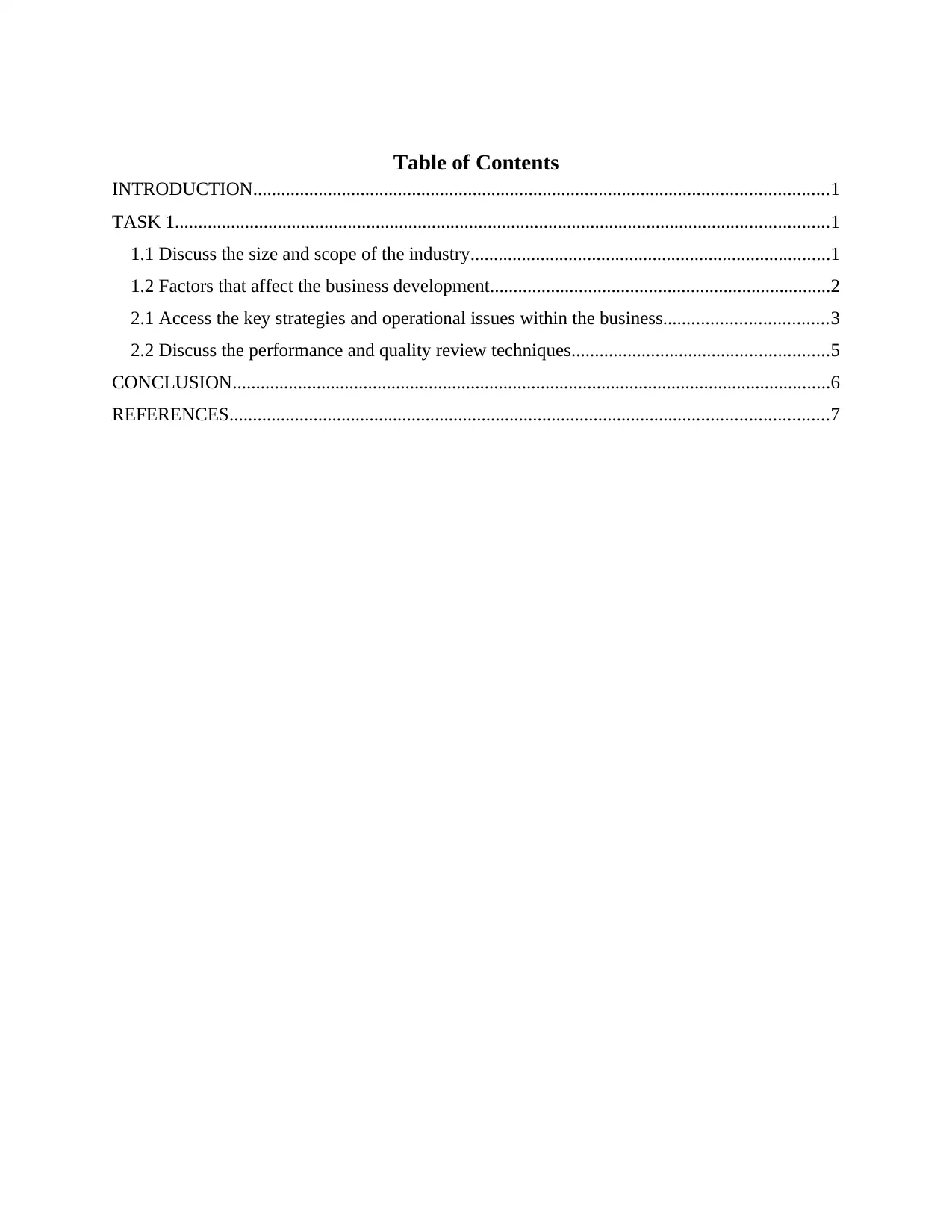
Table of Contents
INTRODUCTION...........................................................................................................................1
TASK 1............................................................................................................................................1
1.1 Discuss the size and scope of the industry.............................................................................1
1.2 Factors that affect the business development.........................................................................2
2.1 Access the key strategies and operational issues within the business...................................3
2.2 Discuss the performance and quality review techniques.......................................................5
CONCLUSION................................................................................................................................6
REFERENCES................................................................................................................................7
INTRODUCTION...........................................................................................................................1
TASK 1............................................................................................................................................1
1.1 Discuss the size and scope of the industry.............................................................................1
1.2 Factors that affect the business development.........................................................................2
2.1 Access the key strategies and operational issues within the business...................................3
2.2 Discuss the performance and quality review techniques.......................................................5
CONCLUSION................................................................................................................................6
REFERENCES................................................................................................................................7
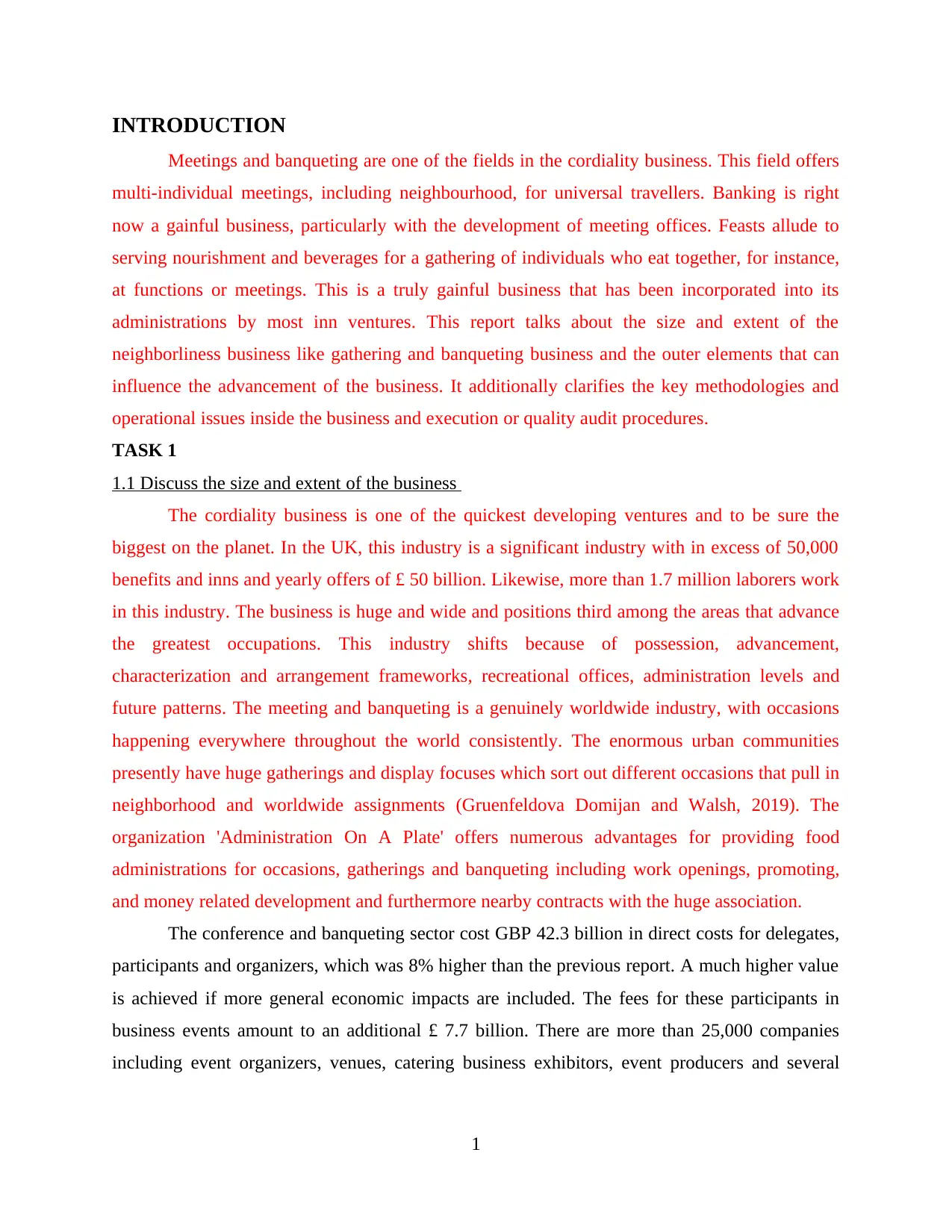
INTRODUCTION
Meetings and banqueting are one of the fields in the cordiality business. This field offers
multi-individual meetings, including neighbourhood, for universal travellers. Banking is right
now a gainful business, particularly with the development of meeting offices. Feasts allude to
serving nourishment and beverages for a gathering of individuals who eat together, for instance,
at functions or meetings. This is a truly gainful business that has been incorporated into its
administrations by most inn ventures. This report talks about the size and extent of the
neighborliness business like gathering and banqueting business and the outer elements that can
influence the advancement of the business. It additionally clarifies the key methodologies and
operational issues inside the business and execution or quality audit procedures.
TASK 1
1.1 Discuss the size and extent of the business
The cordiality business is one of the quickest developing ventures and to be sure the
biggest on the planet. In the UK, this industry is a significant industry with in excess of 50,000
benefits and inns and yearly offers of £ 50 billion. Likewise, more than 1.7 million laborers work
in this industry. The business is huge and wide and positions third among the areas that advance
the greatest occupations. This industry shifts because of possession, advancement,
characterization and arrangement frameworks, recreational offices, administration levels and
future patterns. The meeting and banqueting is a genuinely worldwide industry, with occasions
happening everywhere throughout the world consistently. The enormous urban communities
presently have huge gatherings and display focuses which sort out different occasions that pull in
neighborhood and worldwide assignments (Gruenfeldova Domijan and Walsh, 2019). The
organization 'Administration On A Plate' offers numerous advantages for providing food
administrations for occasions, gatherings and banqueting including work openings, promoting,
and money related development and furthermore nearby contracts with the huge association.
The conference and banqueting sector cost GBP 42.3 billion in direct costs for delegates,
participants and organizers, which was 8% higher than the previous report. A much higher value
is achieved if more general economic impacts are included. The fees for these participants in
business events amount to an additional £ 7.7 billion. There are more than 25,000 companies
including event organizers, venues, catering business exhibitors, event producers and several
1
Meetings and banqueting are one of the fields in the cordiality business. This field offers
multi-individual meetings, including neighbourhood, for universal travellers. Banking is right
now a gainful business, particularly with the development of meeting offices. Feasts allude to
serving nourishment and beverages for a gathering of individuals who eat together, for instance,
at functions or meetings. This is a truly gainful business that has been incorporated into its
administrations by most inn ventures. This report talks about the size and extent of the
neighborliness business like gathering and banqueting business and the outer elements that can
influence the advancement of the business. It additionally clarifies the key methodologies and
operational issues inside the business and execution or quality audit procedures.
TASK 1
1.1 Discuss the size and extent of the business
The cordiality business is one of the quickest developing ventures and to be sure the
biggest on the planet. In the UK, this industry is a significant industry with in excess of 50,000
benefits and inns and yearly offers of £ 50 billion. Likewise, more than 1.7 million laborers work
in this industry. The business is huge and wide and positions third among the areas that advance
the greatest occupations. This industry shifts because of possession, advancement,
characterization and arrangement frameworks, recreational offices, administration levels and
future patterns. The meeting and banqueting is a genuinely worldwide industry, with occasions
happening everywhere throughout the world consistently. The enormous urban communities
presently have huge gatherings and display focuses which sort out different occasions that pull in
neighborhood and worldwide assignments (Gruenfeldova Domijan and Walsh, 2019). The
organization 'Administration On A Plate' offers numerous advantages for providing food
administrations for occasions, gatherings and banqueting including work openings, promoting,
and money related development and furthermore nearby contracts with the huge association.
The conference and banqueting sector cost GBP 42.3 billion in direct costs for delegates,
participants and organizers, which was 8% higher than the previous report. A much higher value
is achieved if more general economic impacts are included. The fees for these participants in
business events amount to an additional £ 7.7 billion. There are more than 25,000 companies
including event organizers, venues, catering business exhibitors, event producers and several
1
⊘ This is a preview!⊘
Do you want full access?
Subscribe today to unlock all pages.

Trusted by 1+ million students worldwide
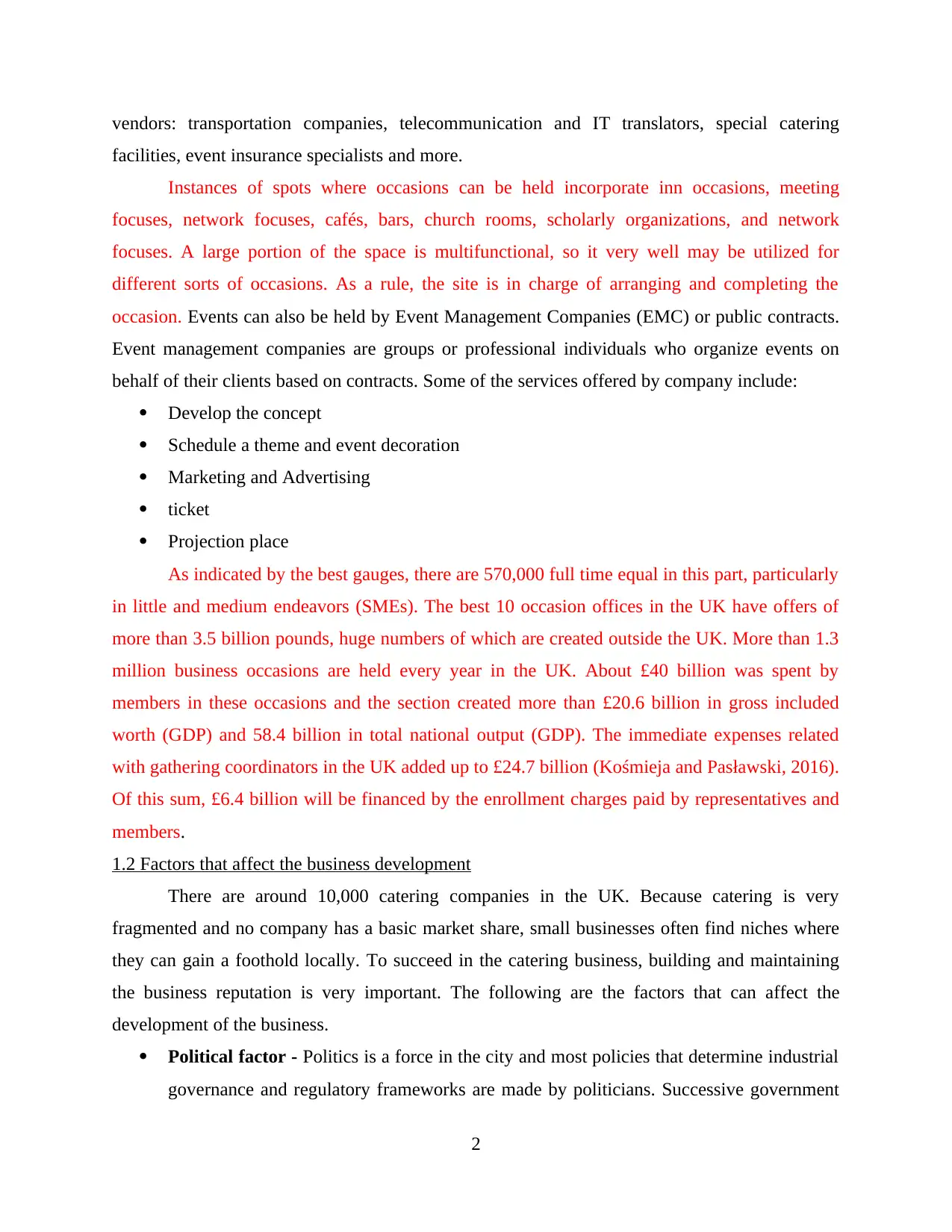
vendors: transportation companies, telecommunication and IT translators, special catering
facilities, event insurance specialists and more.
Instances of spots where occasions can be held incorporate inn occasions, meeting
focuses, network focuses, cafés, bars, church rooms, scholarly organizations, and network
focuses. A large portion of the space is multifunctional, so it very well may be utilized for
different sorts of occasions. As a rule, the site is in charge of arranging and completing the
occasion. Events can also be held by Event Management Companies (EMC) or public contracts.
Event management companies are groups or professional individuals who organize events on
behalf of their clients based on contracts. Some of the services offered by company include:
Develop the concept
Schedule a theme and event decoration
Marketing and Advertising
ticket
Projection place
As indicated by the best gauges, there are 570,000 full time equal in this part, particularly
in little and medium endeavors (SMEs). The best 10 occasion offices in the UK have offers of
more than 3.5 billion pounds, huge numbers of which are created outside the UK. More than 1.3
million business occasions are held every year in the UK. About £40 billion was spent by
members in these occasions and the section created more than £20.6 billion in gross included
worth (GDP) and 58.4 billion in total national output (GDP). The immediate expenses related
with gathering coordinators in the UK added up to £24.7 billion (Kośmieja and Pasławski, 2016).
Of this sum, £6.4 billion will be financed by the enrollment charges paid by representatives and
members.
1.2 Factors that affect the business development
There are around 10,000 catering companies in the UK. Because catering is very
fragmented and no company has a basic market share, small businesses often find niches where
they can gain a foothold locally. To succeed in the catering business, building and maintaining
the business reputation is very important. The following are the factors that can affect the
development of the business.
Political factor - Politics is a force in the city and most policies that determine industrial
governance and regulatory frameworks are made by politicians. Successive government
2
facilities, event insurance specialists and more.
Instances of spots where occasions can be held incorporate inn occasions, meeting
focuses, network focuses, cafés, bars, church rooms, scholarly organizations, and network
focuses. A large portion of the space is multifunctional, so it very well may be utilized for
different sorts of occasions. As a rule, the site is in charge of arranging and completing the
occasion. Events can also be held by Event Management Companies (EMC) or public contracts.
Event management companies are groups or professional individuals who organize events on
behalf of their clients based on contracts. Some of the services offered by company include:
Develop the concept
Schedule a theme and event decoration
Marketing and Advertising
ticket
Projection place
As indicated by the best gauges, there are 570,000 full time equal in this part, particularly
in little and medium endeavors (SMEs). The best 10 occasion offices in the UK have offers of
more than 3.5 billion pounds, huge numbers of which are created outside the UK. More than 1.3
million business occasions are held every year in the UK. About £40 billion was spent by
members in these occasions and the section created more than £20.6 billion in gross included
worth (GDP) and 58.4 billion in total national output (GDP). The immediate expenses related
with gathering coordinators in the UK added up to £24.7 billion (Kośmieja and Pasławski, 2016).
Of this sum, £6.4 billion will be financed by the enrollment charges paid by representatives and
members.
1.2 Factors that affect the business development
There are around 10,000 catering companies in the UK. Because catering is very
fragmented and no company has a basic market share, small businesses often find niches where
they can gain a foothold locally. To succeed in the catering business, building and maintaining
the business reputation is very important. The following are the factors that can affect the
development of the business.
Political factor - Politics is a force in the city and most policies that determine industrial
governance and regulatory frameworks are made by politicians. Successive government
2
Paraphrase This Document
Need a fresh take? Get an instant paraphrase of this document with our AI Paraphraser
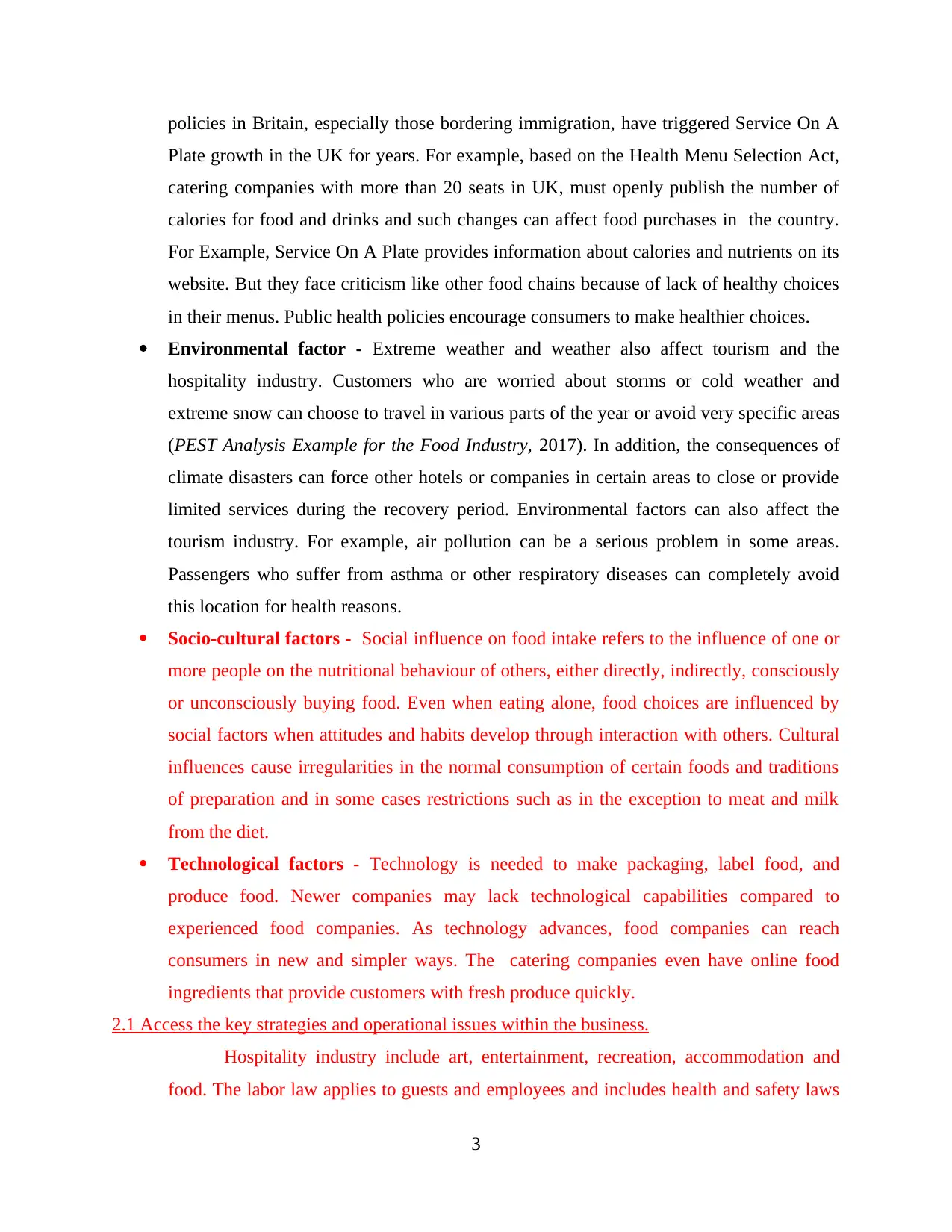
policies in Britain, especially those bordering immigration, have triggered Service On A
Plate growth in the UK for years. For example, based on the Health Menu Selection Act,
catering companies with more than 20 seats in UK, must openly publish the number of
calories for food and drinks and such changes can affect food purchases in the country.
For Example, Service On A Plate provides information about calories and nutrients on its
website. But they face criticism like other food chains because of lack of healthy choices
in their menus. Public health policies encourage consumers to make healthier choices.
Environmental factor - Extreme weather and weather also affect tourism and the
hospitality industry. Customers who are worried about storms or cold weather and
extreme snow can choose to travel in various parts of the year or avoid very specific areas
(PEST Analysis Example for the Food Industry, 2017). In addition, the consequences of
climate disasters can force other hotels or companies in certain areas to close or provide
limited services during the recovery period. Environmental factors can also affect the
tourism industry. For example, air pollution can be a serious problem in some areas.
Passengers who suffer from asthma or other respiratory diseases can completely avoid
this location for health reasons.
Socio-cultural factors - Social influence on food intake refers to the influence of one or
more people on the nutritional behaviour of others, either directly, indirectly, consciously
or unconsciously buying food. Even when eating alone, food choices are influenced by
social factors when attitudes and habits develop through interaction with others. Cultural
influences cause irregularities in the normal consumption of certain foods and traditions
of preparation and in some cases restrictions such as in the exception to meat and milk
from the diet.
Technological factors - Technology is needed to make packaging, label food, and
produce food. Newer companies may lack technological capabilities compared to
experienced food companies. As technology advances, food companies can reach
consumers in new and simpler ways. The catering companies even have online food
ingredients that provide customers with fresh produce quickly.
2.1 Access the key strategies and operational issues within the business.
Hospitality industry include art, entertainment, recreation, accommodation and
food. The labor law applies to guests and employees and includes health and safety laws
3
Plate growth in the UK for years. For example, based on the Health Menu Selection Act,
catering companies with more than 20 seats in UK, must openly publish the number of
calories for food and drinks and such changes can affect food purchases in the country.
For Example, Service On A Plate provides information about calories and nutrients on its
website. But they face criticism like other food chains because of lack of healthy choices
in their menus. Public health policies encourage consumers to make healthier choices.
Environmental factor - Extreme weather and weather also affect tourism and the
hospitality industry. Customers who are worried about storms or cold weather and
extreme snow can choose to travel in various parts of the year or avoid very specific areas
(PEST Analysis Example for the Food Industry, 2017). In addition, the consequences of
climate disasters can force other hotels or companies in certain areas to close or provide
limited services during the recovery period. Environmental factors can also affect the
tourism industry. For example, air pollution can be a serious problem in some areas.
Passengers who suffer from asthma or other respiratory diseases can completely avoid
this location for health reasons.
Socio-cultural factors - Social influence on food intake refers to the influence of one or
more people on the nutritional behaviour of others, either directly, indirectly, consciously
or unconsciously buying food. Even when eating alone, food choices are influenced by
social factors when attitudes and habits develop through interaction with others. Cultural
influences cause irregularities in the normal consumption of certain foods and traditions
of preparation and in some cases restrictions such as in the exception to meat and milk
from the diet.
Technological factors - Technology is needed to make packaging, label food, and
produce food. Newer companies may lack technological capabilities compared to
experienced food companies. As technology advances, food companies can reach
consumers in new and simpler ways. The catering companies even have online food
ingredients that provide customers with fresh produce quickly.
2.1 Access the key strategies and operational issues within the business.
Hospitality industry include art, entertainment, recreation, accommodation and
food. The labor law applies to guests and employees and includes health and safety laws
3
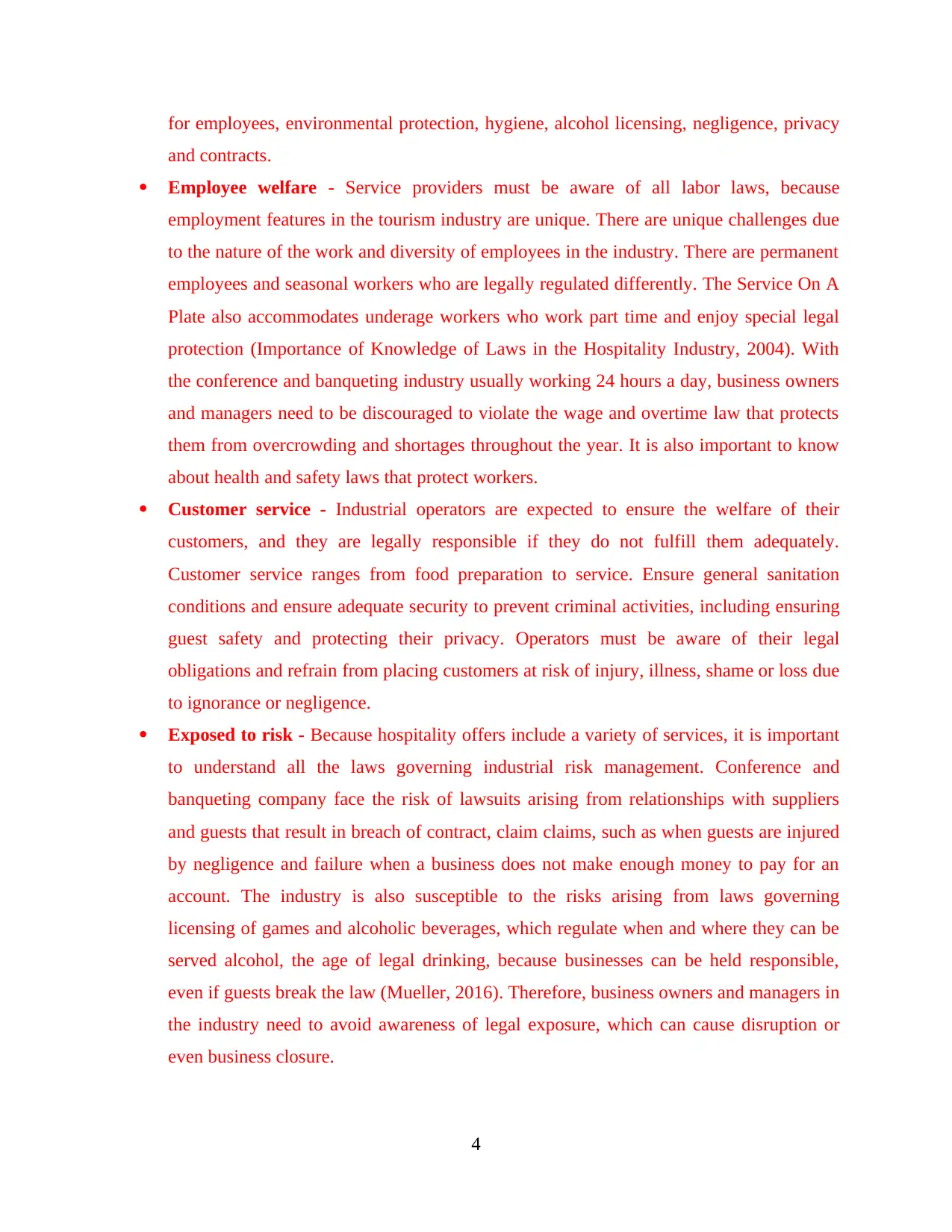
for employees, environmental protection, hygiene, alcohol licensing, negligence, privacy
and contracts.
Employee welfare - Service providers must be aware of all labor laws, because
employment features in the tourism industry are unique. There are unique challenges due
to the nature of the work and diversity of employees in the industry. There are permanent
employees and seasonal workers who are legally regulated differently. The Service On A
Plate also accommodates underage workers who work part time and enjoy special legal
protection (Importance of Knowledge of Laws in the Hospitality Industry, 2004). With
the conference and banqueting industry usually working 24 hours a day, business owners
and managers need to be discouraged to violate the wage and overtime law that protects
them from overcrowding and shortages throughout the year. It is also important to know
about health and safety laws that protect workers.
Customer service - Industrial operators are expected to ensure the welfare of their
customers, and they are legally responsible if they do not fulfill them adequately.
Customer service ranges from food preparation to service. Ensure general sanitation
conditions and ensure adequate security to prevent criminal activities, including ensuring
guest safety and protecting their privacy. Operators must be aware of their legal
obligations and refrain from placing customers at risk of injury, illness, shame or loss due
to ignorance or negligence.
Exposed to risk - Because hospitality offers include a variety of services, it is important
to understand all the laws governing industrial risk management. Conference and
banqueting company face the risk of lawsuits arising from relationships with suppliers
and guests that result in breach of contract, claim claims, such as when guests are injured
by negligence and failure when a business does not make enough money to pay for an
account. The industry is also susceptible to the risks arising from laws governing
licensing of games and alcoholic beverages, which regulate when and where they can be
served alcohol, the age of legal drinking, because businesses can be held responsible,
even if guests break the law (Mueller, 2016). Therefore, business owners and managers in
the industry need to avoid awareness of legal exposure, which can cause disruption or
even business closure.
4
and contracts.
Employee welfare - Service providers must be aware of all labor laws, because
employment features in the tourism industry are unique. There are unique challenges due
to the nature of the work and diversity of employees in the industry. There are permanent
employees and seasonal workers who are legally regulated differently. The Service On A
Plate also accommodates underage workers who work part time and enjoy special legal
protection (Importance of Knowledge of Laws in the Hospitality Industry, 2004). With
the conference and banqueting industry usually working 24 hours a day, business owners
and managers need to be discouraged to violate the wage and overtime law that protects
them from overcrowding and shortages throughout the year. It is also important to know
about health and safety laws that protect workers.
Customer service - Industrial operators are expected to ensure the welfare of their
customers, and they are legally responsible if they do not fulfill them adequately.
Customer service ranges from food preparation to service. Ensure general sanitation
conditions and ensure adequate security to prevent criminal activities, including ensuring
guest safety and protecting their privacy. Operators must be aware of their legal
obligations and refrain from placing customers at risk of injury, illness, shame or loss due
to ignorance or negligence.
Exposed to risk - Because hospitality offers include a variety of services, it is important
to understand all the laws governing industrial risk management. Conference and
banqueting company face the risk of lawsuits arising from relationships with suppliers
and guests that result in breach of contract, claim claims, such as when guests are injured
by negligence and failure when a business does not make enough money to pay for an
account. The industry is also susceptible to the risks arising from laws governing
licensing of games and alcoholic beverages, which regulate when and where they can be
served alcohol, the age of legal drinking, because businesses can be held responsible,
even if guests break the law (Mueller, 2016). Therefore, business owners and managers in
the industry need to avoid awareness of legal exposure, which can cause disruption or
even business closure.
4
⊘ This is a preview!⊘
Do you want full access?
Subscribe today to unlock all pages.

Trusted by 1+ million students worldwide
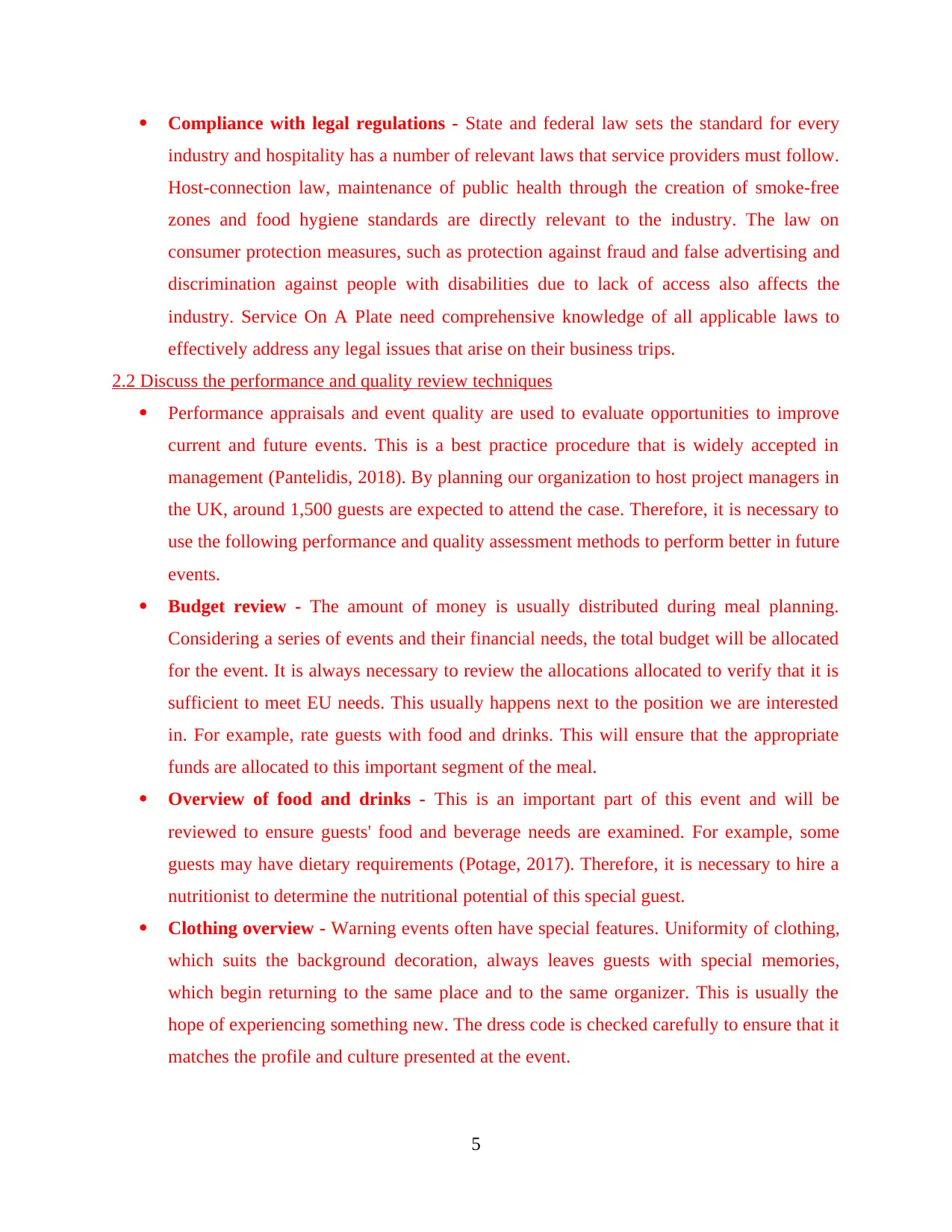
Compliance with legal regulations - State and federal law sets the standard for every
industry and hospitality has a number of relevant laws that service providers must follow.
Host-connection law, maintenance of public health through the creation of smoke-free
zones and food hygiene standards are directly relevant to the industry. The law on
consumer protection measures, such as protection against fraud and false advertising and
discrimination against people with disabilities due to lack of access also affects the
industry. Service On A Plate need comprehensive knowledge of all applicable laws to
effectively address any legal issues that arise on their business trips.
2.2 Discuss the performance and quality review techniques
Performance appraisals and event quality are used to evaluate opportunities to improve
current and future events. This is a best practice procedure that is widely accepted in
management (Pantelidis, 2018). By planning our organization to host project managers in
the UK, around 1,500 guests are expected to attend the case. Therefore, it is necessary to
use the following performance and quality assessment methods to perform better in future
events.
Budget review - The amount of money is usually distributed during meal planning.
Considering a series of events and their financial needs, the total budget will be allocated
for the event. It is always necessary to review the allocations allocated to verify that it is
sufficient to meet EU needs. This usually happens next to the position we are interested
in. For example, rate guests with food and drinks. This will ensure that the appropriate
funds are allocated to this important segment of the meal.
Overview of food and drinks - This is an important part of this event and will be
reviewed to ensure guests' food and beverage needs are examined. For example, some
guests may have dietary requirements (Potage, 2017). Therefore, it is necessary to hire a
nutritionist to determine the nutritional potential of this special guest.
Clothing overview - Warning events often have special features. Uniformity of clothing,
which suits the background decoration, always leaves guests with special memories,
which begin returning to the same place and to the same organizer. This is usually the
hope of experiencing something new. The dress code is checked carefully to ensure that it
matches the profile and culture presented at the event.
5
industry and hospitality has a number of relevant laws that service providers must follow.
Host-connection law, maintenance of public health through the creation of smoke-free
zones and food hygiene standards are directly relevant to the industry. The law on
consumer protection measures, such as protection against fraud and false advertising and
discrimination against people with disabilities due to lack of access also affects the
industry. Service On A Plate need comprehensive knowledge of all applicable laws to
effectively address any legal issues that arise on their business trips.
2.2 Discuss the performance and quality review techniques
Performance appraisals and event quality are used to evaluate opportunities to improve
current and future events. This is a best practice procedure that is widely accepted in
management (Pantelidis, 2018). By planning our organization to host project managers in
the UK, around 1,500 guests are expected to attend the case. Therefore, it is necessary to
use the following performance and quality assessment methods to perform better in future
events.
Budget review - The amount of money is usually distributed during meal planning.
Considering a series of events and their financial needs, the total budget will be allocated
for the event. It is always necessary to review the allocations allocated to verify that it is
sufficient to meet EU needs. This usually happens next to the position we are interested
in. For example, rate guests with food and drinks. This will ensure that the appropriate
funds are allocated to this important segment of the meal.
Overview of food and drinks - This is an important part of this event and will be
reviewed to ensure guests' food and beverage needs are examined. For example, some
guests may have dietary requirements (Potage, 2017). Therefore, it is necessary to hire a
nutritionist to determine the nutritional potential of this special guest.
Clothing overview - Warning events often have special features. Uniformity of clothing,
which suits the background decoration, always leaves guests with special memories,
which begin returning to the same place and to the same organizer. This is usually the
hope of experiencing something new. The dress code is checked carefully to ensure that it
matches the profile and culture presented at the event.
5
Paraphrase This Document
Need a fresh take? Get an instant paraphrase of this document with our AI Paraphraser
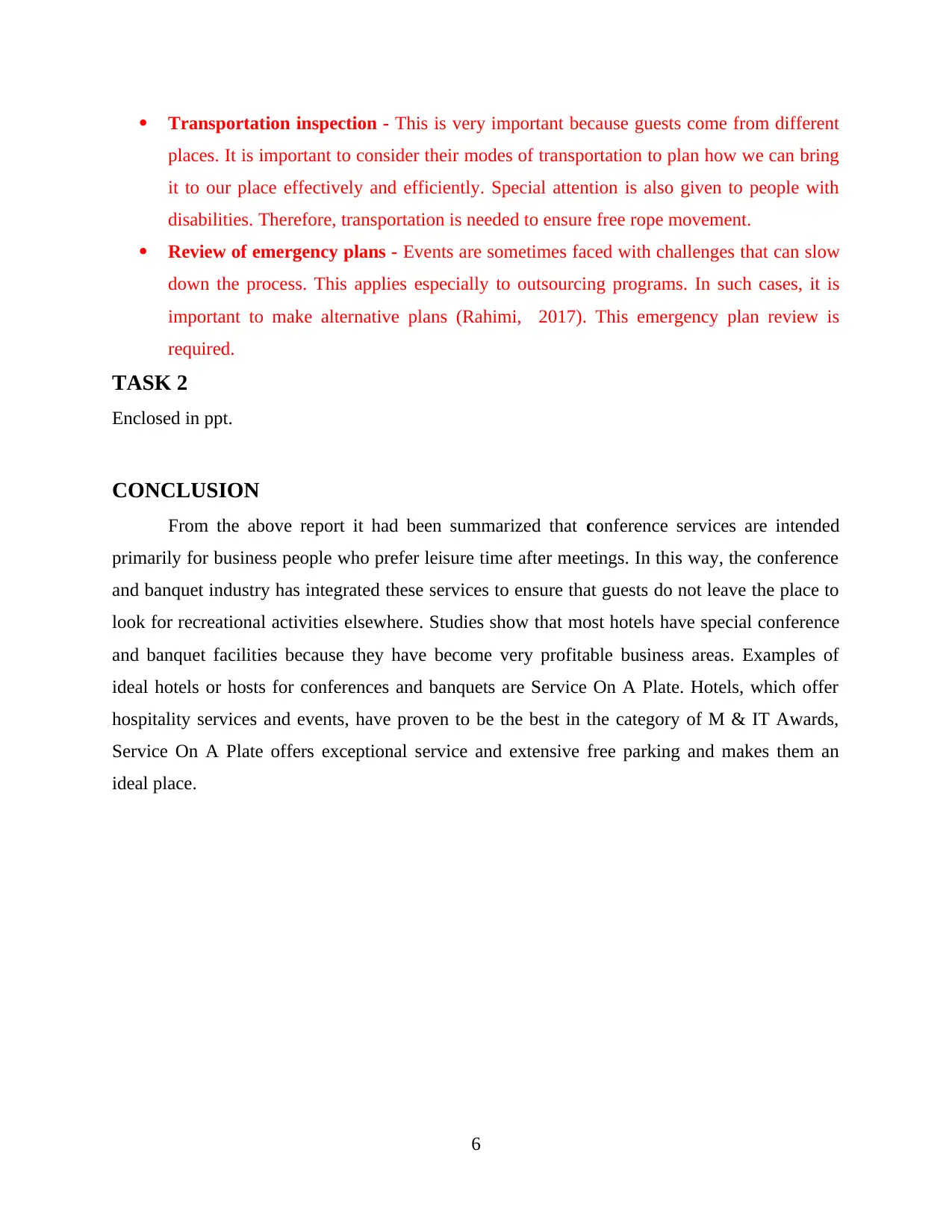
Transportation inspection - This is very important because guests come from different
places. It is important to consider their modes of transportation to plan how we can bring
it to our place effectively and efficiently. Special attention is also given to people with
disabilities. Therefore, transportation is needed to ensure free rope movement.
Review of emergency plans - Events are sometimes faced with challenges that can slow
down the process. This applies especially to outsourcing programs. In such cases, it is
important to make alternative plans (Rahimi, 2017). This emergency plan review is
required.
TASK 2
Enclosed in ppt.
CONCLUSION
From the above report it had been summarized that conference services are intended
primarily for business people who prefer leisure time after meetings. In this way, the conference
and banquet industry has integrated these services to ensure that guests do not leave the place to
look for recreational activities elsewhere. Studies show that most hotels have special conference
and banquet facilities because they have become very profitable business areas. Examples of
ideal hotels or hosts for conferences and banquets are Service On A Plate. Hotels, which offer
hospitality services and events, have proven to be the best in the category of M & IT Awards,
Service On A Plate offers exceptional service and extensive free parking and makes them an
ideal place.
6
places. It is important to consider their modes of transportation to plan how we can bring
it to our place effectively and efficiently. Special attention is also given to people with
disabilities. Therefore, transportation is needed to ensure free rope movement.
Review of emergency plans - Events are sometimes faced with challenges that can slow
down the process. This applies especially to outsourcing programs. In such cases, it is
important to make alternative plans (Rahimi, 2017). This emergency plan review is
required.
TASK 2
Enclosed in ppt.
CONCLUSION
From the above report it had been summarized that conference services are intended
primarily for business people who prefer leisure time after meetings. In this way, the conference
and banquet industry has integrated these services to ensure that guests do not leave the place to
look for recreational activities elsewhere. Studies show that most hotels have special conference
and banquet facilities because they have become very profitable business areas. Examples of
ideal hotels or hosts for conferences and banquets are Service On A Plate. Hotels, which offer
hospitality services and events, have proven to be the best in the category of M & IT Awards,
Service On A Plate offers exceptional service and extensive free parking and makes them an
ideal place.
6
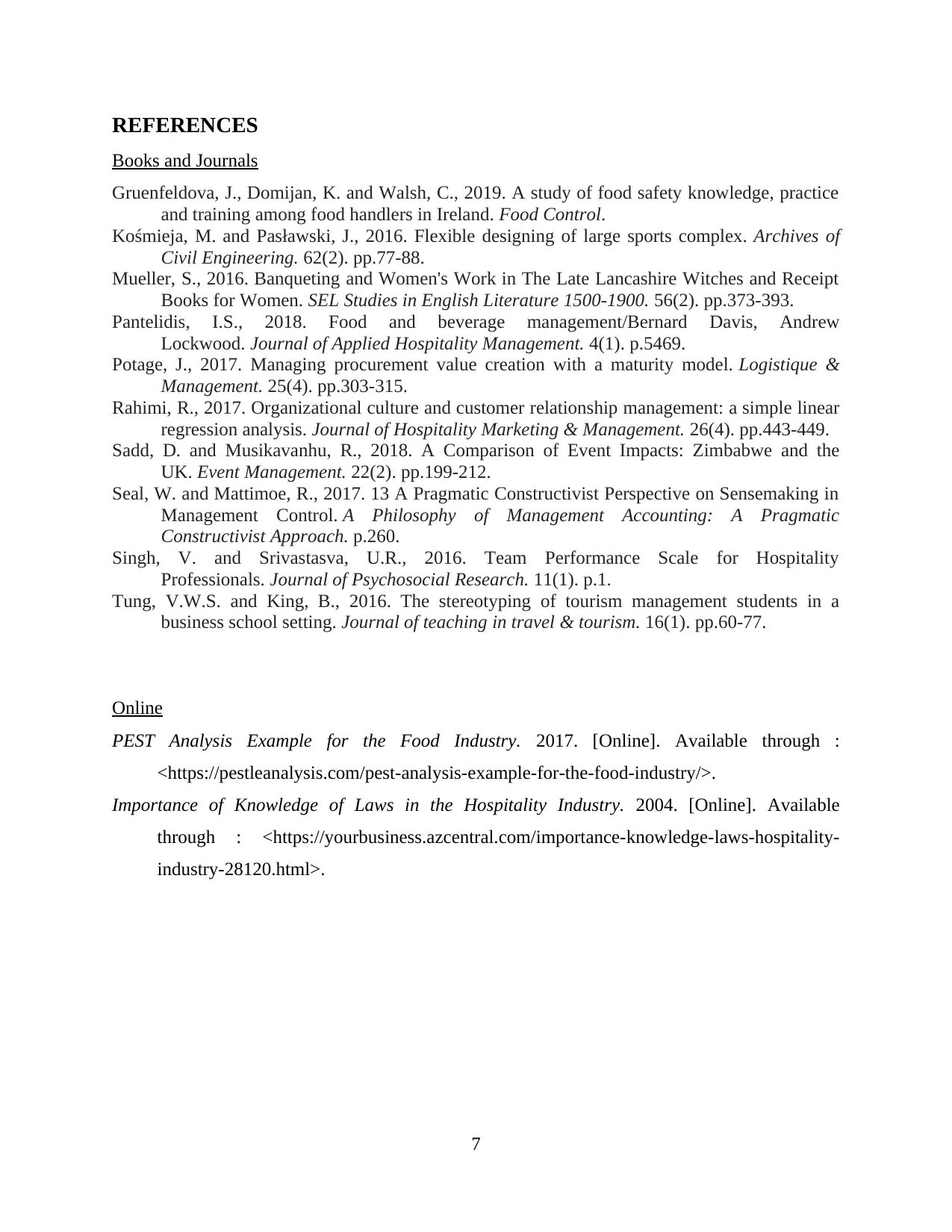
REFERENCES
Books and Journals
Gruenfeldova, J., Domijan, K. and Walsh, C., 2019. A study of food safety knowledge, practice
and training among food handlers in Ireland. Food Control.
Kośmieja, M. and Pasławski, J., 2016. Flexible designing of large sports complex. Archives of
Civil Engineering. 62(2). pp.77-88.
Mueller, S., 2016. Banqueting and Women's Work in The Late Lancashire Witches and Receipt
Books for Women. SEL Studies in English Literature 1500-1900. 56(2). pp.373-393.
Pantelidis, I.S., 2018. Food and beverage management/Bernard Davis, Andrew
Lockwood. Journal of Applied Hospitality Management. 4(1). p.5469.
Potage, J., 2017. Managing procurement value creation with a maturity model. Logistique &
Management. 25(4). pp.303-315.
Rahimi, R., 2017. Organizational culture and customer relationship management: a simple linear
regression analysis. Journal of Hospitality Marketing & Management. 26(4). pp.443-449.
Sadd, D. and Musikavanhu, R., 2018. A Comparison of Event Impacts: Zimbabwe and the
UK. Event Management. 22(2). pp.199-212.
Seal, W. and Mattimoe, R., 2017. 13 A Pragmatic Constructivist Perspective on Sensemaking in
Management Control. A Philosophy of Management Accounting: A Pragmatic
Constructivist Approach. p.260.
Singh, V. and Srivastasva, U.R., 2016. Team Performance Scale for Hospitality
Professionals. Journal of Psychosocial Research. 11(1). p.1.
Tung, V.W.S. and King, B., 2016. The stereotyping of tourism management students in a
business school setting. Journal of teaching in travel & tourism. 16(1). pp.60-77.
Online
PEST Analysis Example for the Food Industry. 2017. [Online]. Available through :
<https://pestleanalysis.com/pest-analysis-example-for-the-food-industry/>.
Importance of Knowledge of Laws in the Hospitality Industry. 2004. [Online]. Available
through : <https://yourbusiness.azcentral.com/importance-knowledge-laws-hospitality-
industry-28120.html>.
7
Books and Journals
Gruenfeldova, J., Domijan, K. and Walsh, C., 2019. A study of food safety knowledge, practice
and training among food handlers in Ireland. Food Control.
Kośmieja, M. and Pasławski, J., 2016. Flexible designing of large sports complex. Archives of
Civil Engineering. 62(2). pp.77-88.
Mueller, S., 2016. Banqueting and Women's Work in The Late Lancashire Witches and Receipt
Books for Women. SEL Studies in English Literature 1500-1900. 56(2). pp.373-393.
Pantelidis, I.S., 2018. Food and beverage management/Bernard Davis, Andrew
Lockwood. Journal of Applied Hospitality Management. 4(1). p.5469.
Potage, J., 2017. Managing procurement value creation with a maturity model. Logistique &
Management. 25(4). pp.303-315.
Rahimi, R., 2017. Organizational culture and customer relationship management: a simple linear
regression analysis. Journal of Hospitality Marketing & Management. 26(4). pp.443-449.
Sadd, D. and Musikavanhu, R., 2018. A Comparison of Event Impacts: Zimbabwe and the
UK. Event Management. 22(2). pp.199-212.
Seal, W. and Mattimoe, R., 2017. 13 A Pragmatic Constructivist Perspective on Sensemaking in
Management Control. A Philosophy of Management Accounting: A Pragmatic
Constructivist Approach. p.260.
Singh, V. and Srivastasva, U.R., 2016. Team Performance Scale for Hospitality
Professionals. Journal of Psychosocial Research. 11(1). p.1.
Tung, V.W.S. and King, B., 2016. The stereotyping of tourism management students in a
business school setting. Journal of teaching in travel & tourism. 16(1). pp.60-77.
Online
PEST Analysis Example for the Food Industry. 2017. [Online]. Available through :
<https://pestleanalysis.com/pest-analysis-example-for-the-food-industry/>.
Importance of Knowledge of Laws in the Hospitality Industry. 2004. [Online]. Available
through : <https://yourbusiness.azcentral.com/importance-knowledge-laws-hospitality-
industry-28120.html>.
7
⊘ This is a preview!⊘
Do you want full access?
Subscribe today to unlock all pages.

Trusted by 1+ million students worldwide
1 out of 9
Related Documents
Your All-in-One AI-Powered Toolkit for Academic Success.
+13062052269
info@desklib.com
Available 24*7 on WhatsApp / Email
![[object Object]](/_next/static/media/star-bottom.7253800d.svg)
Unlock your academic potential
Copyright © 2020–2025 A2Z Services. All Rights Reserved. Developed and managed by ZUCOL.





